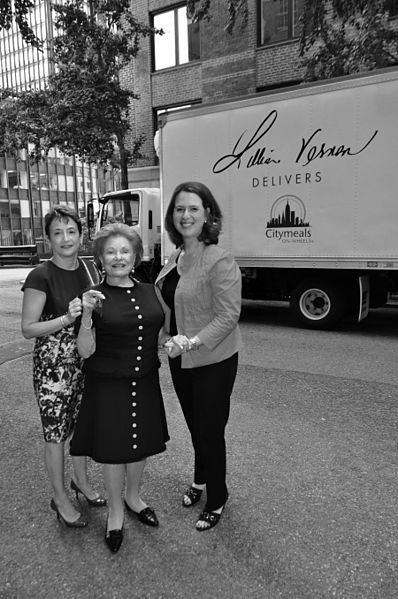
Requiem for a Catalog Queen

Lillian Vernon donates a refrigerated truck to the charity Citymeals-on-Wheels.
I met my heroine, Lillian Vernon, the novelties-catalogue maven who passed away December 14, 2015, at the dedication of the building she’d donated to NYU to house its Creative Writing Department. She’d been firing my imagination for decades, long before this latest lagniappe, and I aimed to tell her so. Mine had been a narrow Bronx district of drearily familiar blocks where, I felt, everyone looked and sounded alike. When the Lillian Vernon catalogue arrived, I feasted. Wood hangers painted to be Russian dancers with outflung legs soaring, a latticework egg in which one stashed dried rose petals to perfume one’s closet, the cheese slicer that evoked Parisian parties, the red silk pincushions from China with tiny people all around the equator holding hands, and a majestic seal you could order with your own initials to shut your correspondence with a coin of swirling wax—all communicated the big possibilities of life.

As did Ms. Vernon’s story itself, as I learned when I was older. She’d started her business at her kitchen table with wedding money, taking out an ad in Seventeen magazine for a monogrammed handbag. The orders poured in. Mrs. Lillian Hochberg named her business for the posh, colonial-sounding town she lived in, Mount Vernon. Then, after her second divorce, she named herself for her business. Thus the girl born Lilli Menasche in Leipzig, a child refugee from Nazi Germany, ended up as Lillian Vernon. Could a story be more American?
I myself had escaped the constrictions of life through an ascent into the study of literature and writing. Still, I lived largely sequestered, my chief obligation being the afternoons I taught at NYU. A lack of pragmatism engulfed me, so much so that when I volunteered to read a brief personal essay in honor of our patron at the dedication of the Lillian Vernon house I was surprised to be told there would be no reading of creative writing on this occasion.
As I approached West Tenth Street on the afternoon of the event, I passed specially assigned police. Limousines gleamed. The parlor-floor rooms were crowded with men in dinner jackets and women in fancy dress. And then, here was Lillian Vernon herself! She was short, and solid, a well-coiffed woman who looked about 70 (she was, in fact, 80), wearing a brilliant turquoise jacket. I gushed to her my story about the Bronx, about her inspiring catalogue which was the very basis of the house of the imagination in which we now stood. She eyed me keenly. Then said, to my amazement: “Did you ever get out?” (Or rather, to be more accurate: “Didja ever get out?”)



